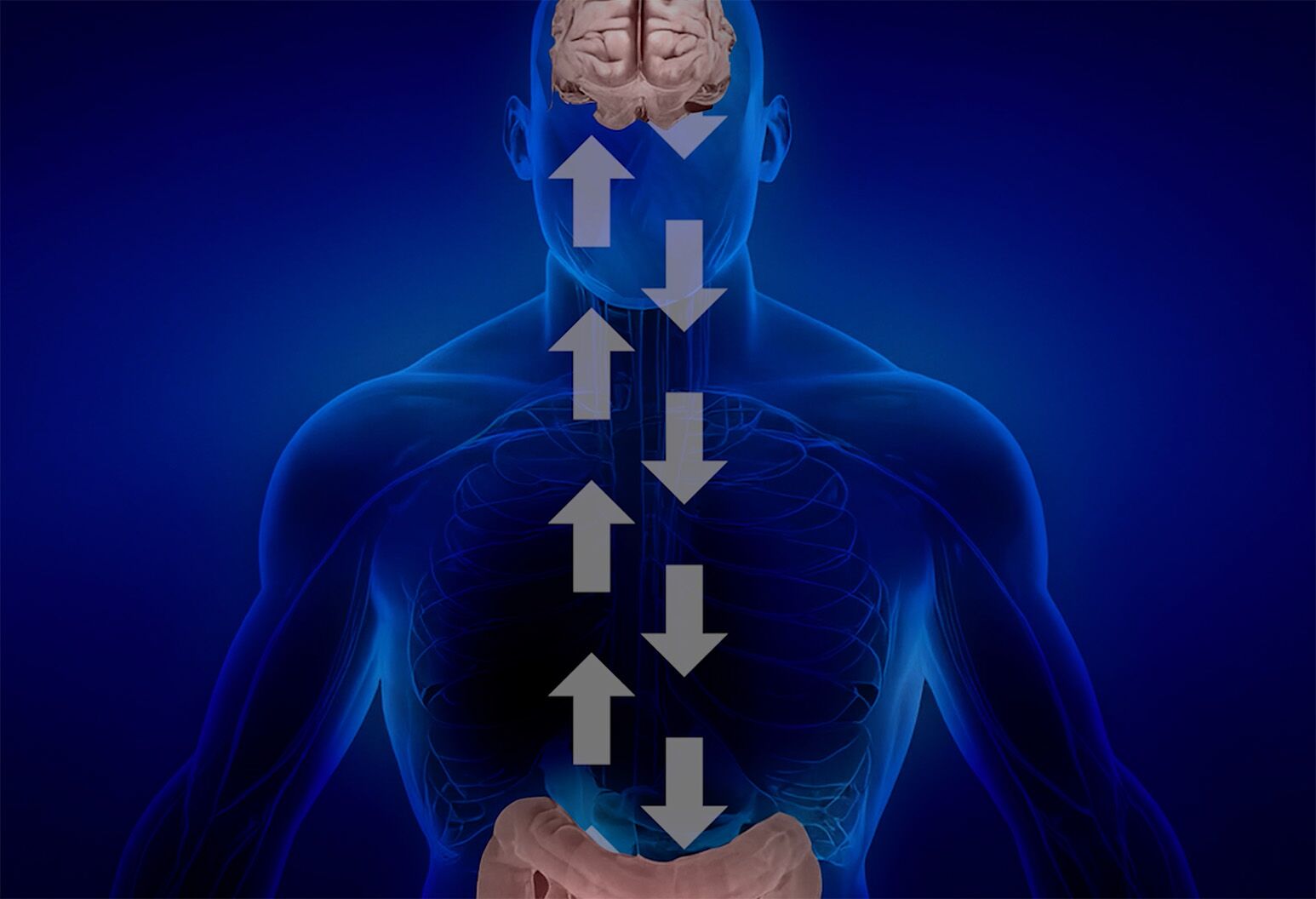The Feinstein Institutes—the research institutes of Northwell Health, New York’s largest health care provider—is home to 50 research labs, 3,000 clinical research studies and 5,000 people raising the standard of medical innovation. We make breakthroughs in molecular medicine, genetics, cancer, brain research, mental health, autoimmunity and bioelectronic medicine.
Insights
The gut-brain axis: how your mind and midsection collaborate
More information is passed between your brain and your gut than any other systems in your body. Understanding this connection could help you lead a happier, healthier life
We’ve all experienced “butterflies” in our stomach when feeling nervous. Some people like to “go with their gut” when making decisions — some think of this as intuition, others a gut feeling.
Whatever you call it, this feeling points to a real instinct and a prime example of the gut-brain connection — also called the gut-brain axis. These two organs are engaged in constant conversation, and if you could listen in, you’d hear them discussing topics that range from the obvious — hunger, digestion and all things food (sensitivities, cravings and preferences) — to some that may surprise you, such as stress, memory and mood to name a few.
A “second brain”
Your gastrointestinal tract, or “gut,” does more than break down food. It plays a vital role in your overall well-being, relaying crucial information about your health beyond just digestion. “The gut is often referred to as our ‘second brain,’” says Benjamin Sahn, MD, a pediatric gastroenterologist and instructor at the Feinstein Institutes’ Institute of Bioelectronic Medicine.
This “second brain” isn't just a metaphor. Second only to your actual brain, the gut contains the body’s largest network of neurons, which are special cells that transmit information throughout the body and are the basic building blocks of nerve communication. The gut’s neurons form the enteric nervous system (ENS), which runs the entire length of your gastrointestinal tract.
“Think of neurons like phones, and your gut has a lot of them,” Dr. Sahn explains. “If your stomach is empty, it uses these neurons to call the brain and say, ‘I’m hungry!’ But the conversation goes both ways. Your brain responds to this information by triggering the sensation of hunger and motivating you to seek out food, while also signaling the digestive system to get ready.”
The brain also “calls” your gut (and other organs) with instructions, like telling the heart to slow down when you’re relaxing. “The vast majority of these important messages are sent back and forth via the vagus nerve, the longest nerve in the body,” Dr. Sahn explains.
Like a switchboard taking many calls simultaneously, the vagus nerve connects the brain to various organs, including the gut, heart and lungs, controlling a wide range of functions, from digestion and breathing to heart rate and even reflexes like coughing.
The vagus nerve is constantly monitoring the state of your organs and relaying that information to the brain, allowing for adjustments and maintaining balance. Whenever there’s a problem, it feeds that information to the brain to try to get things back to normal.
The vagus nerve and the gut
The vagus nerve is particularly active in the gut, which contains most of its sensory nerve endings. Imagine the vagus nerve as a majestic tree. Its trunk originates in the brain, and as it travels down the body, it branches out extensively, reaching into various organs, including the gut. These branches, in turn, divide into smaller and smaller twigs, ultimately culminating in the nerve endings — the leaves of our vagus tree. These "leaves" are the points of contact, where the nerve physically touches the organ or other tissues, and the transmission of signals occurs.
It's at these nerve endings that the vagus nerve can "sense" what's happening in the gut. In addition to feelings of fullness (satiety), the vagus nerve monitors the gut and reports back to the brain about things like nutrient and water levels, the release of digestive enzymes, and even the gut's immune response and inflammation levels.
Some other functions monitored by the vagus nerve include:
- Metabolism and fat storage
- Gastric emptying: how quickly food leaves the stomach
- Peristalsis: the wave-like contractions that move food through the digestive tract
- The release of various gut hormones
But there's another key player that influences the gut-brain conversation: your gut microbiome. It’s made up of trillions of organisms like bacteria, viruses, and fungi located primarily in our intestines, which use chemical signals to communicate with each other and with the brain.
“While the ENS communicates with the brain directly via the vagus nerve, the microbiome communicates with the brain indirectly,” Dr. Sahn explains, “Through a combination of processes, it influences everything from digestion and immunity to mood and even how we respond to stress.”
This indirect communication from the gut microbiome to the brain happens in a few ways:
- Producing chemical messengers: The microbiome produces a variety of chemicals, including short-chain fatty acids (SCFAs) like butyrate, propionate, and acetate. These SCFAs can act as messengers, traveling through the bloodstream and interacting with cells throughout the body, including in the brain. SCFAs can influence brain function in various ways, including impacting mood, appetite and inflammation.
- Interacting with vagus nerve endings: Specific chemical messengers produced by the microbiome can bind to receptors on these vagus nerve endings, like keys fitting into locks. This binding triggers signals that travel up the vagus nerve to the brain, influencing brain activity and function.
A faulty vagus nerve response
Unfortunately, the vagus nerve doesn’t always behave as it should, and the problems can worsen as you age. When this crucial communication pathway malfunctions, it can, like a bad connection on a phone call, disrupt communication between the gut and brain — affecting the ENS’s direct messages, the microbiome’s chemical signals, and the vagus nerve’s own sensory and motor functions. One result: the inflammation meant to protect you and help your body heal turns into a persistent problem.
“Chronic inflammation occurs when the body’s immune system malfunctions and continues to send inflammatory cells to a particular site, even though there is no real threat of disease or injury present,” says Kevin Tracey, MD, president and CEO of the Feinstein Institutes. “Over time, that can actually damage healthy cells and pose a serious threat to your overall health.”
This chronic inflammation can disrupt the gut-brain axis, leading to a variety of health problems. For example, chronic inflammation in the gut can send signals to the brain via the vagus nerve, contributing to mood disorders like anxiety and depression. It can also impair vagus nerve function, making it less effective at regulating gut motility and other digestive processes.
The exact causes of chronic inflammation in certain conditions are unknown and research is ongoing, including at the Feinstein Institutes. But lifestyle choices and environmental factors also influence the gut-brain axis. By making conscious choices, you can actively support both your gut microbiome and healthy vagus nerve function.
Diet
- Whole, unprocessed foods: fruits, vegetables and whole grains are rich in fiber, which acts as prebiotics, nourishing beneficial gut bacteria.
- Fermented foods: yogurt, kefir, sauerkraut and kimchi can also introduce beneficial probiotics directly into your gut. While some individuals may benefit from probiotic supplements, it's best to consult with a health care professional to determine the right approach for you.
“Limiting added sugars, processed foods and artificial sweeteners can help create a gut environment that favors beneficial bacteria,” says Dr. Sahn.
Lifestyle
- Mind-body practices: Deep, slow breathing exercises, yoga, meditation and tai chi can stimulate the vagus nerve and promote relaxation, counteracting the negative effects of stress on the gut.
- Exercise: Regular physical activity, even moderate-intensity exercise like brisk walking or cycling, can have a positive impact on gut motility, reduce inflammation, and support a healthy microbiome, indirectly benefiting vagus nerve function.
- Stress management: Chronic stress can disrupt the gut-brain axis. Incorporating stress-reducing activities like spending time in nature, listening to calming music, or engaging in hobbies can help regulate the vagus nerve and promote gut health.
- Quality sleep: Adequate sleep is essential for overall health, including gut health and vagus nerve function. Aim for 7-9 hours of quality sleep per night.
Things to avoid
- Smoking damages the lining of the gut, disrupts the microbiome, and impairs vagus nerve function.
- Excessive alcohol use can disrupt the gut barrier, leading to inflammation and negatively impacting the microbiome.
- High intake of unhealthy fats: A diet high in saturated and trans fats can promote inflammation and negatively affect the gut microbiome.
"Many people don't realize how interconnected their health goals are," says Dr. Sahn. "Losing weight, quitting smoking, exercising more and improving mood all tie back to gut health and the gut-brain axis."
By making positive lifestyle choices that support your microbiome and vagus nerve, you create a ripple effect that benefits your entire system. Small changes can lead to significant improvements in your overall health and well-being. “The good news is that working toward one goal often positively impacts other areas, leading to a healthier and happier you.”
The gut-brain axis in everyday life
This brings us back to that “gut feeling.” Here’s how this complex interplay between the gut, brain and microbiome manifests in your daily life — and why.
Butterflies in your stomach
That nervous flutter you feel before a big presentation or first date isn't just in your head; it's the interaction of your gut-brain axis. When your brain senses a threat or challenge, it sends stress signals down the vagus nerve. These signals trigger the release of adrenaline, which — by helping prepare you for "fight or flight" — will slow down digestion and redirect blood flow to your muscles. This shift in blood flow and the change in gut motility create the sensation of butterflies.
“Whether it's an external or internal threat, like a virus or infection, our bodies respond accordingly,” Dr. Sahn says. “And once that threat is taken care of, it’s the vagus nerve that’s responsible for calming everything down and getting our systems back to normal.”
Trust your gut
That hunch you have might be more than just a feeling. It could be your brain tapping into the vast network of your enteric nervous system (ENS) and the wisdom of your gut microbiome. Your gut is constantly gathering information about your internal and external environment, and this information, even though you may not be aware of it, can influence your feelings and decisions. It's like your gut has a "sixth sense" about certain situations.
“Some researchers even believe this gut-brain communication plays a role in emotional intelligence, helping us perceive and respond to social cues and navigate complex situations,” Dr. Sahn says.
Comfort food calming you down
Reaching for a warm bowl of oatmeal or a comforting soup when you're stressed might be more than just a habit. Certain foods, particularly those rich in prebiotics (like fruits, vegetables, and whole grains), can nourish beneficial bacteria in your gut. These bacteria produce compounds like short-chain fatty acids that interact with the vagus nerve, sending calming signals to the brain.
Additionally, some comfort foods promote the production of serotonin, a neurotransmitter associated with well-being that is primarily produced in your gut. While most people associate serotonin with the brain, a surprising 90-95% of the body's serotonin is actually generated by the gut, although it doesn't directly affect mood in the same way brain-produced serotonin does.
“Serotonin acts very differently in the gut,” Dr. Sahn says, “influencing digestive functions like motility, the secretion of fluids and electrolytes in the intestines and the gut’s level of sensitivity to pain and other stimuli.”
Ongoing research is exploring the complex interplay between gut serotonin, the microbiome, the vagus nerve and brain function.
Stress causing indigestion
Chronic stress can keep your body in a constant state of "fight or flight," disrupting the vagus nerve's normal rhythm. This can lead to a cascade of gut issues, including slowed digestion, increased gut sensitivity (leading to pain and discomfort), and even changes in the composition of your gut microbiome, further worsening digestion.
Signs that stress is altering gut function include heartburn, bloating, constipation, diarrhea, or irritable bowel syndrome (IBS).
Exercise and mood
Regular physical activity can be a boon for both your physical and mental health, partly thanks to its positive effects on the gut-brain axis. Exercise can improve gut motility, reduce inflammation in the gut, and even promote the growth of beneficial bacteria. These changes can then send positive signals to the brain via the vagus nerve, contributing to improved mood and reduced stress.
“The next time you're feeling down, a brisk walk or a yoga session might be just what your gut (and brain) needs,” Dr. Sahn says.






